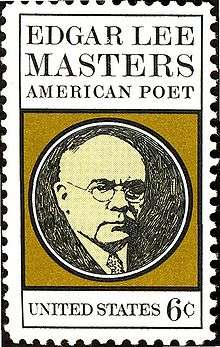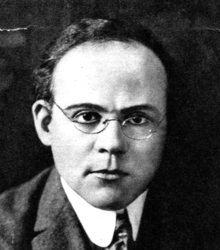Edgar Lee Masters
| Edgar Lee Masters | |
|---|---|
 | |
| Born |
August 23, 1868 Garnett, Kansas, U.S.[1] |
| Died |
March 5, 1950 (aged 81) Melrose Park, Pennsylvania, U.S.[1] |
| Occupation | Poet, biographer, lawyer |
| Notable awards | Robert Frost Medal (1942) |
Edgar Lee Masters (August 23, 1868 – March 5, 1950) was an American attorney, poet, biographer, and dramatist. He is the author of Spoon River Anthology, The New Star Chamber and Other Essays, Songs and Satires, The Great Valley, The Serpent in the Wilderness An Obscure Tale, The Spleen, Mark Twain: A Portrait, Lincoln: The Man, and Illinois Poems. In all, Masters published twelve plays, twenty-one books of poetry, six novels and six biographies, including those of Abraham Lincoln, Mark Twain, Vachel Lindsay, and Walt Whitman.
Life and career

Born in Garnett, Kansas to attorney Hardin Wallace Masters and Emma J. Dexter,[2] his father had briefly moved to set up a law practice, then soon moved back to his paternal grandparents' farm near Petersburg in Menard County, Illinois. In 1880 they moved to Lewistown, Illinois, where he attended high school and had his first publication in the Chicago Daily News. The culture around Lewistown, in addition to the town's cemetery at Oak Hill, and the nearby Spoon River were the inspirations for many of his works, most notably Spoon River Anthology, his most famous and acclaimed work.[3]
He attended Knox Academy in 1889–90, a now defunct preparatory program run by Knox College, but was forced to leave due to his family's inability to finance his education.[1]
After working in his father's law office, he was admitted to the Illinois bar and moved to Chicago, where he established a law partnership in 1893 with the law firm of Kickham Scanlan. He married twice. In 1898 he married Helen M. Jenkins, the daughter of Robert Edwin Jenkins, a lawyer in Chicago, and had three children. During his law partnership with Clarence Darrow from 1903 to 1908, Masters defended the poor. In 1911 he started his own law firm, despite three years of unrest (1908–11) caused by extramarital affairs and an argument with Darrow.
Two of his children followed him with literary careers. His daughter Marcia pursued poetry, while his son Hilary Masters became a novelist. Hilary and his half-brother Hardin wrote a memoir of their father.[4]
Masters died at a nursing home on March 5, 1950, in Melrose Park, Pennsylvania, age 81.[5] He is buried in Oakland cemetery in Petersburg, Illinois. His epitaph includes his poem, "To-morrow is My Birthday" from Toward the Gulf (1918):
Good friends, let’s to the fields…
After a little walk and by your pardon,
I think I’ll sleep, there is no sweeter thing.
Nor fate more blessed than to sleep.
I am a dream out of a blessed sleep-
Let’s walk, and hear the lark.
Family history
Edgar's father was Hardin Wallace Masters, whose father was Squire Davis Masters, whose father was Thomas Masters, whose father was Hillery Masters, the son of Robert Masters (born c. 1715, Prince George's County, Maryland, the son of William W. Masters and wife Mary Veatch Masters). Edgar Lee Masters wrote in his autobiography, Across Spoon River (1936), that his ancestor Hillery Masters was the son of "Knotteley" Masters, but family genealogies show that Hillery and Notley Masters were, in fact, brothers.[6][7]
Poetry
Masters first published his early poems and essays under the pseudonym Dexter Wallace (after his mother's maiden name and his father's middle name) until the year 1903, when he joined the law firm of Clarence Darrow. Masters began developing as a notable American poet in 1914, when he began a series of poems (this time under the pseudonym Webster Ford) about his childhood experiences in Western Illinois, which appeared in Reedy's Mirror, a St. Louis publication.
In 1915 the series was bound into a volume and re-titled Spoon River Anthology. Years later, he wrote a memorable and invaluable account of the book’s background and genesis, his working methods and influences, as well as its reception by the critics, favorable and hostile, in an autobiographical article notable for its human warmth and general interest.[8]
Although he never matched the success of his Spoon River Anthology, he did publish several other volumes of poems including Book of Verses in 1898, Songs and Sonnets in 1910, The Great Valley in 1916, Song and Satires in 1916, The Open Sea in 1921, The New Spoon River in 1924, Lee in 1926, Jack Kelso in 1928, Lichee Nuts in 1930, Gettysburg, Manila, Acoma in 1930, Godbey, sequel to Jack Kelso in 1931, The Serpent in the Wilderness in 1933, Richmond in 1934, Invisible Landscapes in 1935, The Golden Fleece of California in 1936, Poems of People in 1936, The New World in 1937, More People in 1939, Illinois Poems in 1941, and Along the Illinois in 1942.
Lincoln: the Man
In 1931 Masters published the biography Lincoln: the Man, which demythologizes Abraham Lincoln, portraying him as a tool of bankers wanting a new Bank of the United States, "that political system which doles favors to the strong in order to win and keep their adherence to the government", and advocates "a people taxed to make profits for enterprises that cannot stand alone". He claimed the Whig Party led by Lincoln's mentor Henry Clay "had no platform to announce because its principles were plunder and nothing else."[9]
Quotations from the book:
- "The political history of America has been written for the most part by those who were unfriendly to the theory of a confederated republic, or who did not understand it. It has been written by devotees of the protective principle [tariff], by centralists, and to a large degree by New England."
- "For in six weeks he was to inaugurate a war without the American people having anything to say about it. He was to call for and send troops into the South, and thus stir that psychology of hate and fear from which a people cannot extricate themselves, though knowing and saying that the war was started by usurpation. Did he mean that he would bow to the American people when the law was laid down by their courts, through which alone the law be interpreted as the Constitutional voice of the people? No, he did not mean that; because when Taney decided that Lincoln had no power to suspend the writ of habeas corpus, Lincoln flouted and trampled the decision of the court."
- "The War between the States demonstrated that salvation is not of the Jews, but of the Greeks. The World War added to this proof; for Wilson did many things that Lincoln did, and with Lincoln as authority for doing them. Perhaps it will happen again that a few men, deciding what is a cause of war, and what is necessary to its successful prosecution, may, as Lincoln and Wilson did, seal the lips of discussion and shackle the press; but no less the ideal of a just state, which has founded itself in reason and in free speech, will remain."
Notable works
Poetry
- A Book of Verses (1898)
- Songs and Sonnets (1910)
- Spoon River Anthology (1915)
- Songs and Satires (1916)
- Fiddler Jones (1916)
- The Great Valley (New York: Macmillan Co., 1916)
- Toward the Gulf (New York: Macmillan Co., 1918)
- Starved Rock (New York: Macmillan Co., 1919)
- Jack Kelso: A Dramatic Poem (1920)
- Domesday Book (New York: Macmillan Co., 1920)
- The Open Sea (New York: Macmillan Co., 1921)
- The New Spoon River (New York: Macmillan Co., 1924)
- Selected Poems (1925)
- Lichee-Nut Poems (American Mercury, Jan. 1925)
- Lee: A Dramatic Poem (1926)
- Godbey: A Dramatic Poem (1931), sequel to Jack Kelso (1920)
- The Serpent in the Wilderness (1933)
- Richmond: A Dramatic Poem (1934)
- Invisible Landscapes (1935)
- Poems of People (1936)
- The Golden Fleece of California (1936) (poetic narrative)
- The New World (1937)
- More People (1939)
- Illinois Poems (1941)
- Along the Illinois (1942)
- Silence (1946)
- George Gray
- Many Soldiers
- The Unknown
Biographies
- Children of the Market Place: A Fictitious Autobiography (New York: Macmillan Co., 1922). Life of Stephen Douglas.
- Levy Mayer and the New Industrial Era (New Haven: Yale University Press, 1927).[10] Chicago attorney Levy Mayer (1858-1922).
- Lincoln: The Man (1931)
- Vachel Lindsay: A Poet in America (1935)
- Across Spoon River: An Autobiography (memoir) (1936)
- Whitman (1937)
- Mark Twain: A Portrait (1938)
Books
- The New Star Chamber and Other Essays (1904)
- The Blood of the Prophets (1905) (play)
- Althea (1907) (play)
- The Trifler (1908) (play)
- Mitch Miller (novel) (1920)
- Skeeters Kirby (novel) (1923)
- The Nuptial Flight (novel) (1923)
- Kit O'Brien (novel) (1927)
- The Fate of the Jury: An Epilogue to Domesday Book (1929)
- Gettysburg, Manila, Acoma: Three Plays (1930)
- The Tale of Chicago (1933)
- The Tide of Time (novel) (1937)
- The Sangamon (Chicago: University of Illinois Press, 1942, 1988)
Awards & honors
Masters was awarded the Mark Twain Silver Medal in 1936, the Poetry Society of America medal in 1941, the Academy of American Poets Fellowship in 1942, and the Shelly Memorial Award in 1944. In 2014, he was inducted into the Chicago Literary Hall of Fame.[11]
Citations
- 1 2 3 "Edgar Lee Masters profile, ibid". Poets.org. Retrieved 2013-09-10.
- ↑ Profile, illinois.edu; accessed December 13, 2015.
- ↑ Profile, bartleby.com; accessed December 13, 2015.
- ↑ "Jack Masters profile". Jackmasters.net. Retrieved 2013-09-10.
- ↑ Ehrlich, Eugene and Gorton Carruth. The Oxford Illustrated Literary Guide to the United States. New York: Oxford University Press, 1982: p. 206; ISBN 0-19-503186-5
- ↑ The Masters Family, findagrave.com; accessed December 13, 2015.
- ↑ Charles Burgess, "The Maryland-Carolina Ancestry of Edgar Lee Masters", The Great Lakes Review, vol. 8, #2 (Fall 1982-Spring 1983), pp. 51-80.
- ↑ Edgar Lee Masters, "The Genesis of Spoon River", American Mercury, v. 28, no. 109 (January 1933), pp. 38-55.Masters on the Genesis of Spoon River, unz.org; accessed December 13, 2015.
- ↑ Review of Lincoln: the Man, foseti.wordpress.com, April 27, 2013.
- ↑
- ↑ Chicago Literary Hall of Fame website; accessed December 13, 2015.
External links
| Wikisource has original works written by or about: Edgar Lee Masters |
| Wikiquote has quotations related to: Edgar Lee Masters |
| Wikimedia Commons has media related to Edgar Lee Masters. |
- Edgar Lee Masters at the Modern American Poetry Site of the University of Illinois at Urbana-Champaign
- Works by Edgar Lee Masters at Project Gutenberg
- Works by or about Edgar Lee Masters at Internet Archive
- Works by Edgar Lee Masters at LibriVox (public domain audiobooks)

- Books by Edgar Lee Masters in PDF at Penn State's Electronic Classics Series site
- A large collection of Edgar Lee Masters' papers is held at the Harry Ransom Humanities Research Center at The University of Texas at Austin
- Complete text of Spoon River Anthology
- Spoon River Anthology online edition with cross-references and comments
- Agnes Lee - Edgar Lee Masters Papers at Newberry Library
- Dorothy Dow papers, including correspondence with Edgar Lee Masters at Newberry Library
|